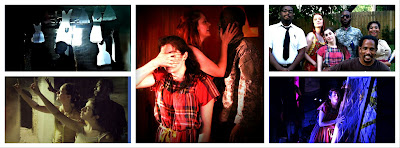
Blog
Pittsburgh Shakespeare in the Park: “The Tempest”
Pastoral Message, July 2012
The fourth commandment is one of the longer ones. It says this: “Remember the sabbath day, to keep it holy. Six days you shall labor, and do all your work; but the seventh day is a sabbath to the Lord your God; in it you shall not do any work, you, or your son or your daughter, your manservant or your maidservant, or your cattle, or the sojourner who is within your gates. For in six days the Lord made heaven and earth, the sea, and all that is in them, and rested the seventh day; therefore the Lord blessed the sabbath day and hallowed it.” We tend to shorten this commandment down to a few words—Honor the sabbath—but that misses out on the emphatic character of this word of the Lord.
As most of you know, a few days after this newsletter arrives in your mailbox (or computer inbox), my family and I will be on a plane heading for a three-month sabbatical in New Zealand. It will be a time of travel and seeing a new country. It will be a time for music study for both Beth and me, finally having the opportunity to learn new repertoire and daily practice on the piano (me) and voice (Beth). It will be a time of study for the children, as they are graciously forgoing a good chunk of their summer vacation to be enrolled in an intermediate school in Auckland for 10 weeks. It will be a time to see new things, visit other church congregations, learn about the multicultural nature of New Zealand society, and make contacts at the University of Auckland. Mostly, it will be an important time to be together as a family, sharing unique experiences in this precious period before the kids enter high school and the “merry-go-round of life” picks up the pace considerably.
Even while I’m on this sabbatical (a time of sabbath rest and study), I will need to be careful about honoring the fourth commandment. It is possible to be even busier away from home than we are in our regular routines. How many times have you returned from a vacation feeling like you need a vacation?! There will be the temptation to take advantage of every possible moment to see all there is to see in New Zealand, since it is doubtful trips of this distance will occur more than once in a lifetime. Fortunately, the kids being in school will keep us grounded in the “mundane,” even as we carve out moments for the “exceptional” and keep our eyes open for the “surprises of God.”
In truth, that is part of the formula for honoring the sabbath and keeping the fourth commandment in all our daily lives. To be “grounded in the mundane” does not mean that we are stuck in ruts and frazzled from trying to maintain impossible work schedules. It means that we are “grounded,” standing on firm foundations that are related to the spiritual and personal priorities in life, which allows us to do the mundane details, confident that our words and deeds are making a difference. And to carve our sabbath “moments for the exceptional” means that we take care to truly notice what is happening around us, to look people in the eye, to listen when they speak of pain or joy from their hearts, as well as to find time to breathe, to walk around, to listen, to “be still and know that God is God.” When those two things happen, then we are able to glimpse the “surprises of God”: the providential way things come together for the good, the transformative way we are able to see people around us as women and men with real stories, real passions, real humanity as sibling children of God with us.
“Surprises of God” happen when we drive through the Fort Pitt tunnel and see our hometown skyline with renewed appreciation–or when a dolphin leaps in a harbor outside Auckland. “Surprises of God” happen when we remember how enriched we are to have friendships that cross racial-ethnic-economic barriers, whether here or overseas. “Surprises of God” happen when a prayer is offered for someone else, whom we trust enough to ask them to pray for something in our lives as well, whether that involves Pittsburghers or New Zealanders.
While I’m away, I will send back some dispatches from abroad to let you know how things are going, even as I will receive occasional e-mail dispatches from Gloria and the staff. Heather, Patrice, Christiane and Mary Lynn will be leading worship and providing pastoral care, and you will continue to be a caring, active, God-directed congregation. My family flies back home on October 6 and I will resume work on October 15. My sincere prayer is that this upcoming season will provide many opportunities for all of us to re-learn how to honor the Sabbath, to rest and be renewed, and to be uplifted by the grace and “surprises” of our loving God.
HA Teaching Artists Performing in RELATIVE POSITIONS
Pastoral Message, June 2012
As the summer fast approaches, people are busy considering vacations and travel plans. There are lots of logistics involved in picking up from one place and visiting another: Who will care for the house when we’re gone? What should be done with the pets? Will I have the right clothing packed? How long should we stay away and what will we see along the way? As my family prepares for our time overseas, these questions are frequent topics of conversation around the dinner table.
The theme of travel is a common one throughout the bible. Abraham and Sarah left their ancient home to follow God’s call into a new land. Joseph and his family moved to Egypt during a long season of drought. Moses and the Hebrew people wandered for forty years in the wilderness before settling into their new tribal homeland. The Israelites were forced into exile in far away Babylon and later were allowed to travel back home. Jesus was an itinerant rabbi, of whom it was said “Foxes have holes and birds of the air have nests, but the Son of Man has nowhere to lay his head.” Paul’s missionary life was spent spreading the gospel among the cities along the coastline of the Mediterranean Sea.
We may long for lives spent quietly at home, enjoying the routines and comforts of well-worn paths and familiar surroundings. But lives of faith almost always involve movement and travel–for reasons both practical and theological. The practical reason is that we are meant to live out our faith in community. It is through our interactions with others in church, on the street, in the stores, or during times of travel outside our home area that our faith becomes part of our public testimony in a hurting world. Just as Jesus walked the streets, talked to those on the margins of life, and took time to comfort the ailing and bless the children, we are to walk the streets as living ambassadors of Christ’s love.
The theological reason that travel is important relates to our belief that God is present in all the world. Psalm 139: If I ascend to heaven, you are there; if I make my bed in Sheol, you are there. If I take the wings of the morning and settle at the farthest limits of the sea, even there your hand shall lead me … and hold me fast. By going out into the world, we are moving in places where God is already active. And by looking for God’s “fingerprints” in foreign lands or listening for God’s “voice” as it is spoken through words delivered with a different accent, we live into the fullness and richness of our global faith.
One last point: I recently read a comment from a returning Iraq war veteran, who said this: “I have been welcomed home many times, but I have never come all the way back from the places I have been.” The veteran was speaking how the experience of war never fully leaves those who travel abroad on military or humanitarian missions. Alternately, the impact on our souls from mission trips or visiting foreign places stays with us long after our suitcases are unpacked and stored away. We never come all the way back from those places we visit that are outside our comfort zones or immediate neighborhoods. The good news is that God is with us both here and there, and whatever we bring back from our travels is something that bears the loving “fingerprints” of our global, eternal, wayfaring God.
“Full of Noises” Showcase Performance!
These performances are FREE. Doors will open at 6:45 pm each night. If you want to get up close and personal, bring a pillow for in-front-of-the-front-row seating.
Pastoral Message, May 2012
If we spent March and early April in the season of Lent, thinking about how our broken lives were part of the reason Christ went to the cross, the goal now is for us to spend April and most of May considering how we can let the Easter good news shine forth from our lives for all the world to see.
Last month I wrote about Easter in terms of “movement”; this month I want to speak about Easter in terms of “location.” First, when Mary Magdalene went to the tomb and found that the stone had been rolled away, her main question was, What have they done to my Lord?(John 20:13,15). In those first moments of Easter, location was the key to everything. Where was Jesus’ body? The answer to that held the central message of Easter, for Jesus’ body was no longer in a tomb because he was alive! Jesus was out in the world, appearing to the disciples and then united in Spirit with the faithful of all times and places as the resurrected Lord.
This resurrection miracle means that Jesus is no longer limited in terms of location. Jesus the risen Christ is one with God the Creator, and therefore available in every place through the power and grace of the Holy Spirit. No one place is privileged over another; all are equi-distant from God as well as equally accessible to God. No place is beyond God’s realm of love and justice, which also means that the Easter message links us to all people near and far. We, like Mary Magdalene, are to tell the good news of Easter to all the world. And wherever others struggle or are treated unjustly, we are to still ask the question Mary asked at the tomb: What have they done to my sister in the Lord? What have they done to my brother in Christ? As the apostle Paul wrote, “If one member [of the body of Christ] suffers, all suffer together with it; if one member is honored, all rejoice together with it” (I Corinthians 12:26). Thanks to the Easter resurrection, this injunction about suffering and honor is no longer bound to any one location.
Second, I want to share an old Jewish legend. Long ago, a man named Isaac lived in Cracow. He was very poor, but he dreamed three times about a great treasure buried under a bridge in the distant city of Prague. So he journeyed there to find it, but discovered that the bridge he had seen in his dream was patrolled day and night by the king’s guards. He circled the spot from a distance, when one of the guards noticed him and called him forward. When asked what he was doing, Isaac quickly told him about his dream. The captain laughed at the idea of believing in such night visions. “If I believed in dreams, I would have to go all the way to Cracow and find some man named Isaac, because I have dreamed that a great treasure lies buried beneath his bed!” Isaac thanks the captain, returned home, pushed aside his bed, and dug up the treasure that had been there all along.
Rabbi Harold Kushner told this story, and his closing words are true for both Jewish and Christian listeners. “What we are seeking is not in the past or in the future. It is not far away or in the possession of others. It is exactly where we are.” For each of us, remember that the location of the Easter good news ultimately is right where we are. This month start with yourself, then share the good news with others in word and deed!
Pastoral Message, April 2012
In reading through the Easter stories in the gospels, I was struck by how much movement is associated with this special day: The women made their way to the cemetery in the early morning light and then ran back to the others with the news that Christ was alive! Two disciples hurried to examine the empty tomb and rushed back to share what they discovered. Two other disciples encountered Jesus while walking on the road to Emmaus and then retraced their steps back to Jerusalem with the news of their experience. And Simon Peter leapt from his boat and excitedly swam to shore when he spotted the risen Christ waiting for him near the water’s edge. Walking, running, swimming, racing out of breath to tell the good news of life conquering death: all these action verbs are at the heart of the Easter message.
And yet when we gather to remember Easter nowadays, we enter into church sanctuaries and respectfully, quietly, sit in our pew as the gospel is read to us…
Of course there are times of movement on Easter morning. In our church services, we greet one another with a hug and the invigorating greeting, “Christ is risen! He is risen indeed!” We stand to sing our Easter hymns of praise; we move around throughout the day to come to church, to return home, to follow after kids on Easter egg hunts, to gather together at shared meals with family and friends. But all those examples are movements that happen simply because it is Easter, as opposed to “Easter movements.” Let me explain the difference.
Living a life of Christian faith involves a certain number of necessary movements. For example, we move from one place to another to attend church; we make our way to different classrooms for Adult Education classes; we bow our heads at meal times to offer a prayer; we take a walk outdoors and offer thanks to God for life, health, and the beauty of creation. Those are nice “movements,” but they are more functional than exceptional.
Christian faith also involves distinctive movements, special movements, and “Easter movements.” A distinctive movement may be one that turns us off our normal path and takes us down a new road in which we serve others or care for someone on life’s margins. A special movement could be one that follows a time of reconciliation that we didn’t expect or earn, or comes as a heart-warming consequence of hearing words of love and compassion spoken to us by others. Lastly, an Easter movement is best compared to the actions of the Easter cast of characters: It is the fresh awareness that death is neither this world’s dominant reality nor the final word in our relationships with God and one another (like the women at the tomb). It is the mind-changing revelation that our version of reality pales in comparison to God’s version of this created order (like the disciples on Easter day). It is that spirit that causes us to dance, to leap into the water (like Simon Peter of old), to step out by faith, feeling in that act more alive than ever before. Easter movements involve engagement, peacemaking with our heart and soul, justice expressed through little deeds and grand visions, and hope that cannot be dissuaded or deterred at all.
We gather in church on Easter to remember the story. But we get up, move and leave the church to be the Easter story. By God’s grace, may you be moved in distinctive, special, faithful ways this day and every day!
EL CEO Performing in HEAR/NOW Fringe Festival
In addition, twenty $10 tickets will be held at the door for each performance for Hope Academy students and family members. These tickets are first-come-first-served, so get there early enough to get your reduced priced tickets.
Many of Hope Academy’s teaching artists will be performing in the festival including Deidre Huckabay, Elliot Beck, Jerry Gaudi and Naoko Hirai with Alia Musica, under the direction of Federico Garcia, on Friday at 8:00 pm; and Ashley Buckley with Freya Quartet on Saturday at 5:15 pm (free program at the Kelly Strayhorn).
EL CEO performers are encouraged to attend the Alia Musica performance on Friday evening at 8:00 pm. This portion of the program also includes Tim Munro from the Grammy-awarding winning group Eighth Blackbird.






